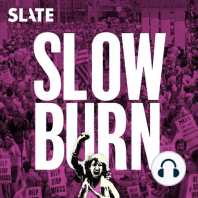3 min listen
Decoder Ring: The Mailbag Episode
FromSlow Burn
ratings:
Length:
39 minutes
Released:
Jan 3, 2023
Format:
Podcast episode
Description
We’re really lucky to get a lot of listener emails, suggesting topics for the show. In this episode, we’re going to dig into a handful of the most fascinating ones that we’ve yet to tackle on the show. We’re taking on five listener questions that run the gamut—from kids menus to succulents to the chicken that crossed the road. It’s an eclectic assortment of subjects that come to us thanks to you. So let’s jump into our mailbag.
Thank you to Mark Liberman and Susan Schulten.
This podcast was written by Willa Paskin who produces the show with Katie Shepherd. This episode was also produced by Sam Kim. Derek John is Slate’s Executive Producer of Narrative Podcasts. Merritt Jacob is Senior Technical Director.
If you haven’t please yet, subscribe and rate our feed in Apple Podcasts or wherever you get your podcasts. And even better, tell your friends.
If you’re a fan of the show and want to support us, consider signing up for Slate Plus.
Slate Plus members get to listen to Decoder Ring without any ads. Their support is also crucial to our work. So please go to Slate.com/decoderplus to join Slate Plus today.
Learn more about your ad choices. Visit megaphone.fm/adchoices
Thank you to Mark Liberman and Susan Schulten.
This podcast was written by Willa Paskin who produces the show with Katie Shepherd. This episode was also produced by Sam Kim. Derek John is Slate’s Executive Producer of Narrative Podcasts. Merritt Jacob is Senior Technical Director.
If you haven’t please yet, subscribe and rate our feed in Apple Podcasts or wherever you get your podcasts. And even better, tell your friends.
If you’re a fan of the show and want to support us, consider signing up for Slate Plus.
Slate Plus members get to listen to Decoder Ring without any ads. Their support is also crucial to our work. So please go to Slate.com/decoderplus to join Slate Plus today.
Learn more about your ad choices. Visit megaphone.fm/adchoices
Released:
Jan 3, 2023
Format:
Podcast episode
Titles in the series (100)
Coming Nov. 28: A podcast about Watergate. by Slow Burn
